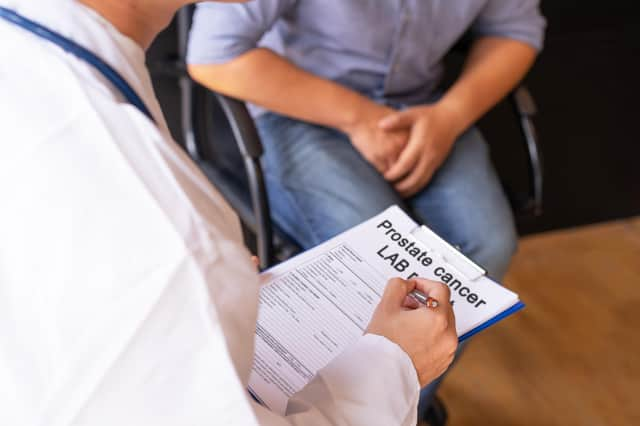Getting checked out for prostate cancer surely is a no brainer - Steve Cardownie


Showing no signs of any symptoms, it wasn’t until I asked my local surgery for a blood test to determine my Prostate Specific Antigen (PSA) levels that I found that it was abnormally high after which a biopsy revealed that I had a cancerous tumour on my prostate.
After taking some time to absorb the news and choosing which treatment I felt best suited me, I underwent Brachytherapy treatment at The Western General. This treatment consisted of inserting a number of radioactive seeds (in my case 90) into the prostate to effectively kill off the tumour. I was in the operating theatre at 11.30am and in the pub by 4.30pm, so, a simple and painless procedure, which seems to have done the trick – but that’s enough about me.
Advertisement
Hide AdAdvertisement
Hide AdThe survival rates for all stages of prostate cancer are actually quite encouraging. More than 85 out of 100 (more than 85 per cent) will survive their cancer for five years or more and 80 out of 100 (80 per cent) will survive their cancer for 10 years or more.
Prostate cancer develops in the prostate gland in men and is one of the most common types of cancer, usually seen in men over the age of 50. It is a slow-growing cancer and, more often, it is confined to the prostate gland requiring minimal, or in some cases, no treatment.
The figures for Scotland show that more than 3,800 men are diagnosed with prostate cancer every year and more than 1,000 lose their lives to the disease, also every year. However, about 32,000 men are living with, and after, prostate cancer in this country, so early diagnosis and treatment has been proven to work.
There is a mine of information about the prostate gland, what it does and the possible symptoms which may indicate a problem on the internet or in a local library, so lack of information is not an issue here.
Advertisement
Hide AdAdvertisement
Hide AdMost men with early prostate cancer do not have any symptoms, so men over the age of 50 would be well advised to consult their GP, which, at the very least, might dispell any fears that they may have.
Any man over the age of 50 is entitled to a blood test to ascertain their PSA level if they so wish, even if their GP might not wholeheartedly agree.
The Prostate Cancer UK website informs us that: “There are advantages and disadvantages to having a PSA test. Your GP should explain these to you and discuss any questions you may have before you decide whether to have it.” (my emphasis)
It can sometimes give a false reading, but I, for one, would rather take that risk, rather than blissfully going about my business as usual only to discover sometime later that I had prostate cancer, but which has now been allowed to reach a more advanced stage.
At the end of the day, it is down to individual choice, but getting it checked surely is a no brainer!